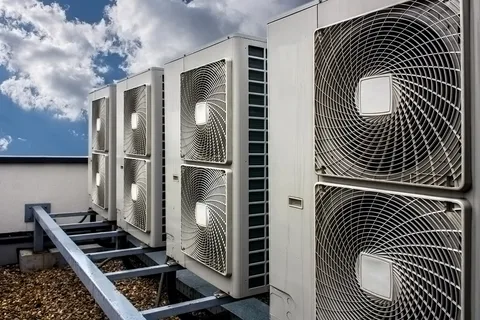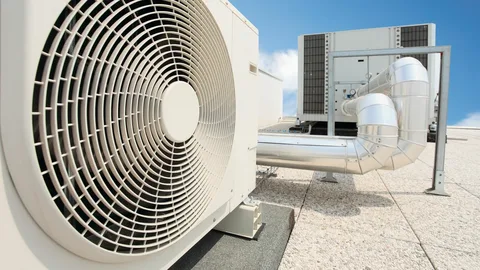Ventilation plays a crucial role in keeping the air in your home or office clean and healthy. Good quality heat ventilation is essential for preventing a build-up of moisture, harmful pollutants, and odours. From improving air quality to creating a more comfortable environment, there are many benefits to investing in quality ventilation systems.
Heat Ventilation System Improve Indoor Air Quality
Good quality ventilation is crucial for improving the indoor air quality of your home or office. With a heat ventilation system in place, you can ensure that the air you breathe is clean and healthy. This system helps to remove pollutants, allergens, and other harmful particles from the air, reducing the risk of respiratory issues and allergies.
One of the key advantages of a ventilation system is its ability to remove stale air and replace it with fresh, filtered air. This is particularly important in spaces that are tightly sealed or have poor natural ventilation. By continuously circulating and filtering the air, a ventilation system helps to eliminate odours and keep the air fresh.
In addition to removing pollutants, a ventilation system can also regulate humidity levels. This is important because high levels of moisture can lead to mould growth and other health hazards. By maintaining optimal humidity levels, a ventilation system helps to create a comfortable and healthy environment.
HRV Ventilation System Increase Energy Efficiency
Are you looking for ways to make your home or office more energy-efficient? Look no further than the HRV ventilation system. Not only does it improve indoor air quality, but it also helps to increase energy efficiency.
One of the main advantages of using an HRV system is its ability to recover heat from the outgoing air and transfer it to the incoming air. This means that during the colder months, the system can warm up the fresh air coming into your space, reducing the need for additional heating. By reducing your reliance on heating, you can save on energy costs and reduce your carbon footprint.
In addition to heat recovery, an HRV system can also help to regulate the temperature in your space. By continuously exchanging the air, the system helps to distribute heat evenly throughout your home or office. This eliminates hot or cold spots, creating a more comfortable environment and reducing the need for excessive heating or cooling.
Heat Recovery System Enhance Comfort Levels
Having a heat recovery system in place can greatly enhance the comfort levels in your home or office. This system works by extracting the heat from the outgoing air and transferring it to the incoming air, resulting in a more balanced and comfortable environment.
One of the main ways a recovery system enhances comfort is by providing a consistent and even temperature throughout your space. No more dealing with chilly corners or stuffy rooms. The system helps distribute heat evenly, ensuring that every part of your home or office is at the desired temperature.
In addition, a heating system also helps to reduce drafts and cold spots. By continuously circulating the air and eliminating stagnant pockets of cold air, you can enjoy a more comfortable and cozy space.
Say goodbye to constantly adjusting the thermostat or layering up with blankets. With this recovery system, you can achieve optimal comfort levels throughout your home or office, allowing you to relax and enjoy your surroundings.
HRV Ventilation Reduce Moisture Build-Up
One of the major advantages of using ventilation is its ability to reduce moisture build-up in your home or office. Excess moisture in the air can lead to a range of issues, including mould growth, musty odours, and damage to your property. But with an HRV ventilation in place, you can say goodbye to these problems.
By continuously exchanging the air, an HRV helps to remove excess moisture from your space. It replaces the humid air with fresh, dry air, creating a healthier and more comfortable environment. It is particularly important in areas like bathrooms and kitchens, where moisture levels tend to be higher.
By reducing moisture build-up, an HRV system also helps to prevent the growth of mold and mildew. These can be harmful to your health and cause structural damage to your property. With proper ventilation, you can keep these issues at bay and enjoy a clean and mold-free space.
Reducing the Risk of Mould Growth
Mould growth is a common issue in homes and offices, and it can pose serious health risks if left unaddressed. Fortunately, quality ventilation systems can play a crucial role in reducing the risk of mould growth. One of the main causes of mould growth is excess moisture in the air. When the air is stagnant or humid, it creates the perfect environment for mould spores to thrive and multiply. However, with a good ventilation system in place, you can effectively reduce moisture levels and discourage the growth of mould.
Ventilation systems, such as ventilation or HRV systems, continuously exchange the air in your space, replacing humid air with fresh, dry air. By maintaining optimal humidity levels, these systems create an environment that is less conducive to mould growth. Additionally, the continuous circulation of air helps to prevent stagnant pockets of moisture, further reducing the risk of mould growth.
Investing in quality ventilation not only improves air quality and comfort but also helps to keep your space mould-free. By reducing the risk of mould growth, you can ensure a healthier environment for yourself and your family or colleagues. Breathe easier and enjoy peace of mind knowing that your space is protected from mould and its potential health hazards.
Heat Exchange Ventilation Maximize Airflow for Optimal Health
When it comes to your health, having optimal airflow is crucial. It is where heat exchange ventilation comes into play. This ventilation system is designed to maximize airflow, ensuring that you and your family or colleagues breathe in fresh, clean air for optimal health.
One of the main advantages of ventilation is its ability to constantly circulate and filter the air in your home or office. This helps to remove pollutants, allergens, and other harmful particles, reducing the risk of respiratory issues and allergies. With improved airflow, you can breathe easier and enjoy a healthier environment.
In addition to improving air quality, it also helps to regulate temperature and humidity levels. By continuously exchanging the air, the system helps to distribute heat evenly throughout your space, creating a more comfortable environment. It also helps to reduce humidity levels, preventing the growth of mould and other health hazards.
Investing in a ventilation not only maximizes airflow but also contributes to your overall health and well-being. With fresh, clean air circulating in your space, you can enjoy a healthier and more comfortable environment for optimal health.
Whole House Ventilation Provides Peaceful Environment
Having a whole-house ventilation system in place not only improves the air quality and comfort of your home or office, but it also provides a peaceful environment that promotes relaxation and tranquility. With whole house ventilation, you can say goodbye to stuffy and stagnant air that can make you feel uncomfortable and restless.
Instead, you can enjoy a constant flow of fresh, clean air that creates a soothing atmosphere throughout your space. This constant circulation of air helps to eliminate odours, keeping your home or office smelling fresh and inviting. It also helps to reduce the presence of allergens and pollutants, which can cause irritation and disrupt your peace of mind.
In addition, whole-house ventilation helps to regulate humidity levels, preventing excessive moisture that can lead to mould growth and musty odours. By maintaining optimal humidity, you can create an environment that feels comfortable and calming. Investing in whole-house ventilation not only provides health benefits but also creates a peaceful and serene environment where you can relax, unwind, and enjoy the serenity of your surroundings.
FAQS
How often Should I Clean or Replace the Filters in My Ventilation System?
It is recommended to clean or replace your filters every 3-6 months, depending on the level of pollutants in your space. This ensures optimal airflow and efficiency.
Can I Install a Ventilation System Myself, or Do I Need Professional Help?
While some ventilation systems may be DIY-friendly, it is always best to consult with a professional to ensure proper installation and functionality.
What Is the Difference between a Heat Ventilation System and an HRV Ventilation System?
A ventilation system transfers heat from the outgoing air to the incoming air, while an ventilation system not only transfers heat but also recovers moisture, providing better humidity control.
Conclusion
In conclusion, investing in quality ventilation systems for your home or office offers a wide range of advantages. From improving indoor air quality to increasing energy efficiency and enhancing comfort levels, there are many reasons why you should consider installing a ventilation system. By using a ventilation system, you can ensure that the air you breathe is clean and healthy.



